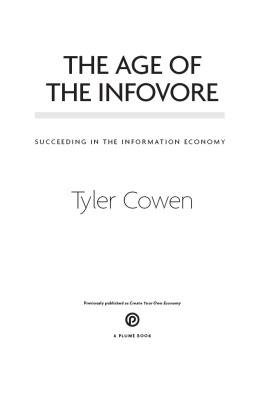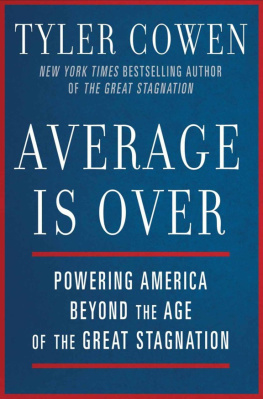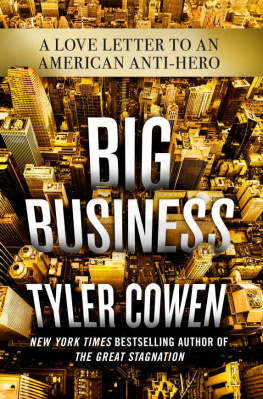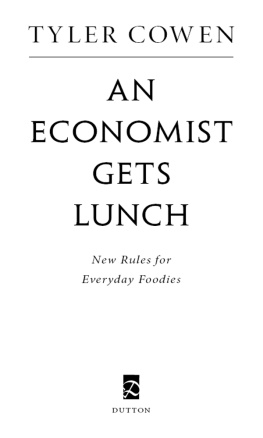Tyler Cowen - Risk and Business Cycles (Foundations of the Market Economy)
Here you can read online Tyler Cowen - Risk and Business Cycles (Foundations of the Market Economy) full text of the book (entire story) in english for free. Download pdf and epub, get meaning, cover and reviews about this ebook. year: 1997, publisher: Taylor and Francis, genre: Romance novel. Description of the work, (preface) as well as reviews are available. Best literature library LitArk.com created for fans of good reading and offers a wide selection of genres:
Romance novel
Science fiction
Adventure
Detective
Science
History
Home and family
Prose
Art
Politics
Computer
Non-fiction
Religion
Business
Children
Humor
Choose a favorite category and find really read worthwhile books. Enjoy immersion in the world of imagination, feel the emotions of the characters or learn something new for yourself, make an fascinating discovery.
- Book:Risk and Business Cycles (Foundations of the Market Economy)
- Author:
- Publisher:Taylor and Francis
- Genre:
- Year:1997
- Rating:4 / 5
- Favourites:Add to favourites
- Your mark:
- 80
- 1
- 2
- 3
- 4
- 5
Risk and Business Cycles (Foundations of the Market Economy): summary, description and annotation
We offer to read an annotation, description, summary or preface (depends on what the author of the book "Risk and Business Cycles (Foundations of the Market Economy)" wrote himself). If you haven't found the necessary information about the book — write in the comments, we will try to find it.
Risk and Business Cycles (Foundations of the Market Economy) — read online for free the complete book (whole text) full work
Below is the text of the book, divided by pages. System saving the place of the last page read, allows you to conveniently read the book "Risk and Business Cycles (Foundations of the Market Economy)" online for free, without having to search again every time where you left off. Put a bookmark, and you can go to the page where you finished reading at any time.
Font size:
Interval:
Bookmark:
How does monetary policy affect the real economy?
Risk and Business Cycles develops an integrated framework for assessing the roles of both monetary and real shocks in the business cycle. The author uses modern treatments of risk, finance and expectations to develop an innovative and challenging critique of the Austrian school of economics. Drawing upon contemporary methods of empirical and econometric research, the work examines how changes in risk, real interest rates and finance constraints alter the likelihood of intertemporal plan coordination. The author presents a synthesis of the older Austrian perspective on business cycles with contemporary theories of financial risk and real business cycles to construct a unified framework. A case is put forward for the revival of an important role for monetary causes in business cycle theory, which challenges the current trend towards favoring purely real theories.
Presenting a challenging critique of the Austrian school, this volume will be of interest to all those interested in business cycles, as well as Austrian economics.
Tyler Cowen is Professor of Economics at George Mason University.
Edited by Mario J.Rizzo, New York University and Lawrence H.White, University of Georgia
A central theme of this series is the importance of understanding and assessing the market economy from a perspective broader than the static economics of perfect competition and Pareto optimality. Such a perspective sees markets as causal processes generated by the preferences, expectations and beliefs of economic agents. The creative acts of entrepreneurship that uncover new information about preferences, prices and technology are central to these processes with respect to their ability to promote the discovery and use of knowledge in society.
The market economy consists of a set of institutions that facilitate voluntary cooperation and exchange among individuals. These institutions include the legal and ethical framework as well as more narrowly economic patterns of social interaction. Thus the law, legal institutions and cultural or ethical norms, as well as ordinary business practices and monetary phenomena, fall within the analytical domain of the economist.
Other titles in the series
THE MEANING OF MARKET PROCESS
Essays in the development of modern Austrian economics
Israel M.Kirzner
PRICES AND KNOWLEDGE
A market-process perspective
Esteban F.Thomsen
KEYNES GENERAL THEORY OF INTEREST
A reconsideration
Fiona C.Maclachlan
LAISSEZ-FAIRE BANKING
Kevin Dowd
EXPECTATIONS AND THE MEANING OF INSTITUTIONS
Essays in economics by Ludwig Lachmann
Edited by Don Lavoie
PERFECT COMPETITION AND THE TRANSFORMATION OF
ECONOMICS
Frank M.Machovec
CYCLES
New and Old Austrian Perspectives

London and New York
First published 1997
by Routledge
11 New Fetter Lane, London EC4P 4EE
This edition published in the Taylor & Francis e-Library, 2003.
Simultaneously published in the USA and Canada
by Routledge
29 West 35th Street, New York, NY 10001
1997 Tyler Cowen
All rights reserved. No part of this book may be reprinted or
reproduced or utilized in any form or by any electronic,
mechanical, or other means, now known or hereafter
invented, including photocopying and recording, or in any
information storage or retrieval system, without permission in
writing from the publishers.
British Library Cataloguing in Publication Data
A catalogue record for this book is available from the British Library
Library of Congress Cataloging in Publication Data
Cowen, Tyler.
Risk and Business Cycles: New and Old Austrian Perspectives/Tyler Cowen.
p. cm. (Foundations of the modern economy)
Includes bibliographical references.
1. Business cycles. 2. Risk. 3. Austrian school of economists. I. Title. II. Series.
HB3711.C684 1997
338.542dc21 9713794
ISBN 0-203-44813-8 Master e-book ISBN
ISBN 0-203-75637-1 (Adobe eReader Format)
ISBN 0-415-16919-4 (Print Edition)
eISBN: 978-1-13470-150-6
I have received useful comments from many individuals, including Fischer Black, Meyer Burstein, Kevin Grier, Robin Grier, Randall Holcombe, Steve Horwitz, Randall Kroszner, Axel Leij?ontiufvud, Marc Poitras, Mario Rizzo, George Selgin, Jim Strain, Alex Tabarrok, Lawrence White, Katarina Zajc, an anonymous referee, and seminar participants at New York University, George Mason University, and the Southern Economic Association. My thanks also to Alan Jarvis and Alison Kirk in their roles as editors at Routledge.
INTRODUCTION
Entrepreneurs seek to match their production to market demands. To the extent that chosen outputs satisfy market demands and earn profits, the plans of consumers and producers are coordinated. How this coordination ever comes about, and why it might sometimes fail to occur, remain central questions for macroeconomics. In this book I shall focus on the coordination of investment and product purchase plans over time.
More specifically, I will examine whether intertemporal coordination provides a useful organizing theme for business cycle research. This investigation pursues the research program of the Austrian school of economics (e.g., Menger, Mises, Hayek), using modern treatments of risk, finance, and expectations, and drawing upon contemporary methods of empirical and econometric research. I examine how changes in risk, real interest rates, and finance constraints alter the likelihood of intertemporal plan coordination. I will attempt to synthesize modern real business cycle theory, the work of David Lilien and Fischer Black on sectoral shifts, and the older Austrian analyses of monetary and capital theory, with the purpose of constructing an investment-based approach to business cycles in its most plausible form.
The questions I address include the following:
- What risk-return trade-offs do entrepreneurs face in evaluating alternative investments, and how might these trade-offs account for some features of business cycles? examines this initial question in purely real terms, focusing on intertemporal coordination.
- Can changes in the nominal money supply create real sectoral shifts? considers whether real and monetary theories of business cycles can be unified in terms of a general theory of sectoral shifts towards and away from riskier investments.
- What are the policy implications of intertemporal coordination theories of the business cycle? money growth rules, interest rate smoothing, nominal GNP rules, and other policy options, including fixed and floating exchange rates.
- Does the traditional Austrian theory of the trade cycle satisfactorily unify real and monetary business cycle theories? argues that the traditional Austrian approach fails to establish its central contention the link between positive rates of nominal money growth and excessive capital-intensity.
- How might an investment-based approach to business cycles avoid some of the problems with the traditional Austrian approach? Chapters .
- Does the evidence support risk-based, investment-based, and Austrian theories of the business cycle? Does the evidence support the case for real effects of monetary policy, operating through an investment channel? surveys the empirical work that has been done on these issues.
Font size:
Interval:
Bookmark:
Similar books «Risk and Business Cycles (Foundations of the Market Economy)»
Look at similar books to Risk and Business Cycles (Foundations of the Market Economy). We have selected literature similar in name and meaning in the hope of providing readers with more options to find new, interesting, not yet read works.
Discussion, reviews of the book Risk and Business Cycles (Foundations of the Market Economy) and just readers' own opinions. Leave your comments, write what you think about the work, its meaning or the main characters. Specify what exactly you liked and what you didn't like, and why you think so.









